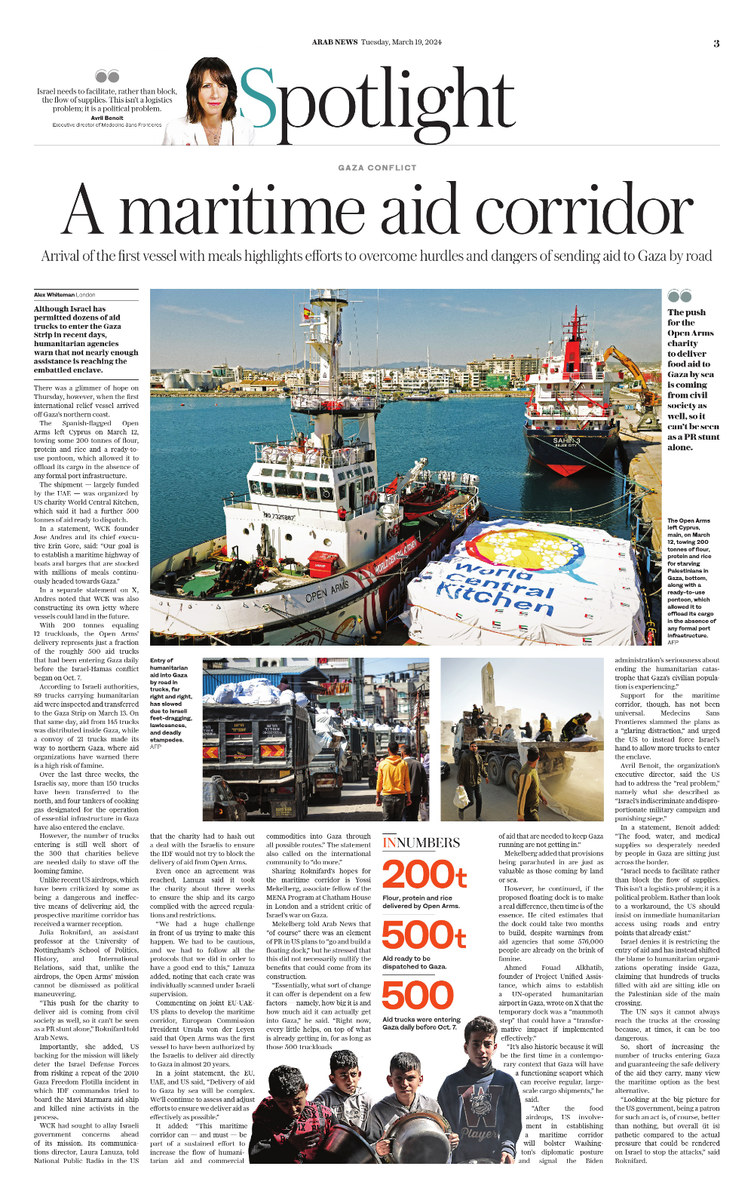LONDON: Although Israel has permitted dozens of aid trucks to enter the Gaza Strip in recent days, humanitarian agencies warn that not nearly enough assistance is reaching the embattled enclave.
There was a glimmer of hope on Thursday, however, when the first international relief vessel arrived off Gaza’s northern coast.
The Spanish-flagged Open Arms left Cyprus on March 12, towing some 200 tons of flour, protein and rice and a ready-to-use pontoon, which allowed it to offload its cargo in the absence of any formal port infrastructure.
The shipment — largely funded by the UAE — was organized by US charity World Central Kitchen (WCK), which said it had a further 500 tons of aid ready to dispatch.
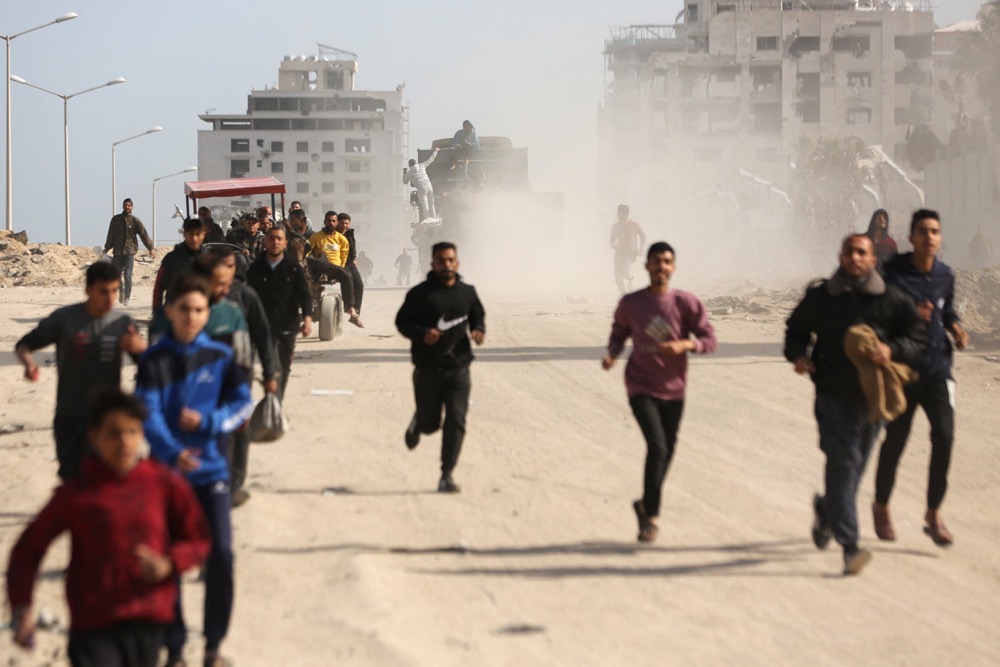
Entry of humanitarian aid into Gaza by road in trucks has slowed due to Israeli feet-dragging, lawlessness, and deadly stampedes. (AFP)
In a statement, WCK founder Jose Andres and its chief executive Erin Gore, said: “Our goal is to establish a maritime highway of boats and barges that are stocked with millions of meals continuously headed towards Gaza.”
In a separate statement on X, Andres noted that WCK was also constructing its own jetty where vessels could land in the future.
With 200 tons equaling 12 truckloads, the Open Arms’ delivery represents just a fraction of the roughly 500 aid trucks that had been entering Gaza daily before the Israel-Hamas conflict began on Oct. 7.
According to Israeli authorities, 89 trucks carrying humanitarian aid were inspected and transferred to the Gaza Strip on March 13. On that same day, aid from 145 trucks was distributed inside Gaza, while a convoy of 21 trucks made its way to northern Gaza, where aid organizations have warned there is a high risk of famine.
Over the last three weeks, the Israelis say, more than 150 trucks have been transferred to the north, and four tankers of cooking gas designated for the operation of essential infrastructure in Gaza have also entered the enclave.
However, the number of trucks entering is still well short of the 300 that charities believe are needed daily to stave off the looming famine.
Unlike recent US airdrops, which have been criticized by some as being a dangerous and ineffective means of delivering aid, the prospective maritime corridor has received a warmer reception.
Julia Roknifard, an assistant professor at the University of Nottingham’s School of Politics, History, and International Relations, said that, unlike the airdrops, the Open Arms’ mission cannot be dismissed as political maneuvering.
“This push for the charity to deliver aid is coming from civil society as well, so it can’t be seen as a PR stunt alone,” Roknifard told Arab News.
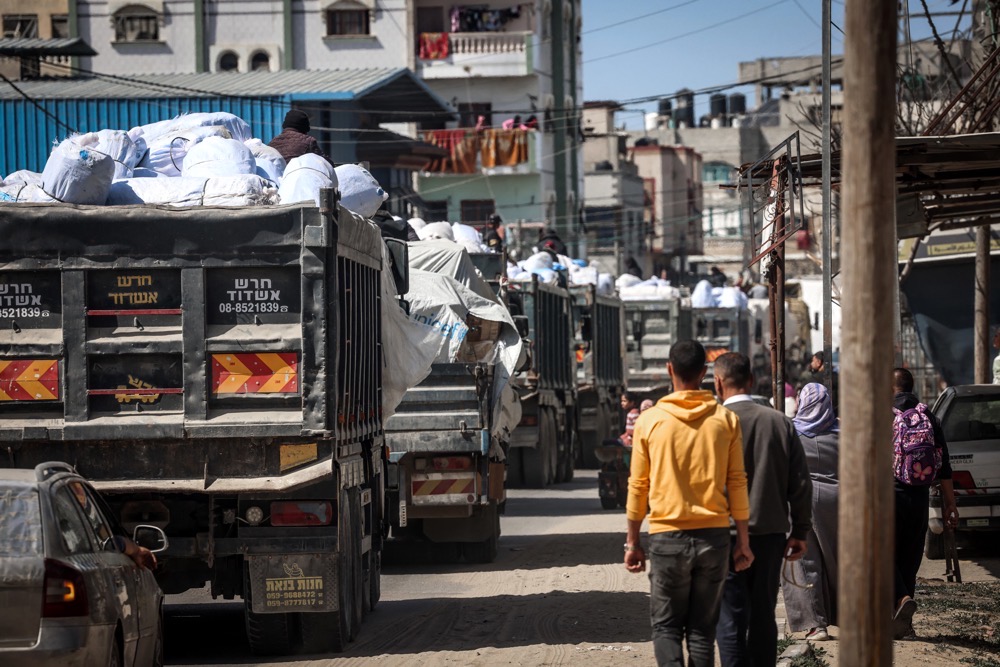
With 200 tons equaling 12 truckloads, the Open Arms’ delivery represents just a fraction of the roughly 500 aid trucks that had been entering Gaza daily before the Israel-Hamas conflict began on Oct. 7. (AFP)
Importantly, she added, US backing for the mission will likely deter the Israel Defense Forces from risking a repeat of the 2010 Gaza Freedom Flotilla incident in which IDF commandos tried to board the Mavi Marmara aid ship and killed nine activists in the process.
WCK had sought to allay Israeli government concerns ahead of its mission. Its communications director, Laura Lanuza, told National Public Radio in the US that the charity had to hash out a deal with the Israelis to ensure the IDF would not try to block the delivery of aid from Open Arms.
Even once an agreement was reached, Lanuza said it took the charity about three weeks to ensure the ship and its cargo complied with the agreed regulations and restrictions.
“We had a huge challenge in front of us trying to make this happen. We had to be cautious, and we had to follow all the protocols that we did in order to have a good end to this,” Lanuza added, noting that each crate was individually scanned under Israeli supervision.
Commenting on joint EU-UAE-US plans to develop the maritime corridor, European Commission President Ursula von der Leyen said that Open Arms was the first vessel to have been authorized by the Israelis to deliver aid directly to Gaza in almost 20 years.
INNUMBERS
• 200 Tons of flour, protein and rice delivered by Open Arms.
• 500 Tons of aid ready to be dispatched to Gaza.
• 500 Aid trucks were entering Gaza daily Oct. 7.
In a joint statement, the EU, UAE, and US said, “Delivery of aid to Gaza by sea will be complex. We’ll continue to assess and adjust efforts to ensure we deliver aid as effectively as possible.”
It added: “This maritime corridor can — and must — be part of a sustained effort to increase the flow of humanitarian aid and commercial commodities into Gaza through all possible routes.” The statement also called on the international community to “do more.”
Sharing Roknifard’s hopes for the maritime corridor is Yossi Mekelberg, associate fellow of the MENA Program at Chatham House in London and a strident critic of Israel’s war on Gaza.
Mekelberg told Arab News that “of course” there was an element of PR in US plans to “go and build a floating dock,” but he stressed that this did not necessarily nullify the benefits that could come from its construction.
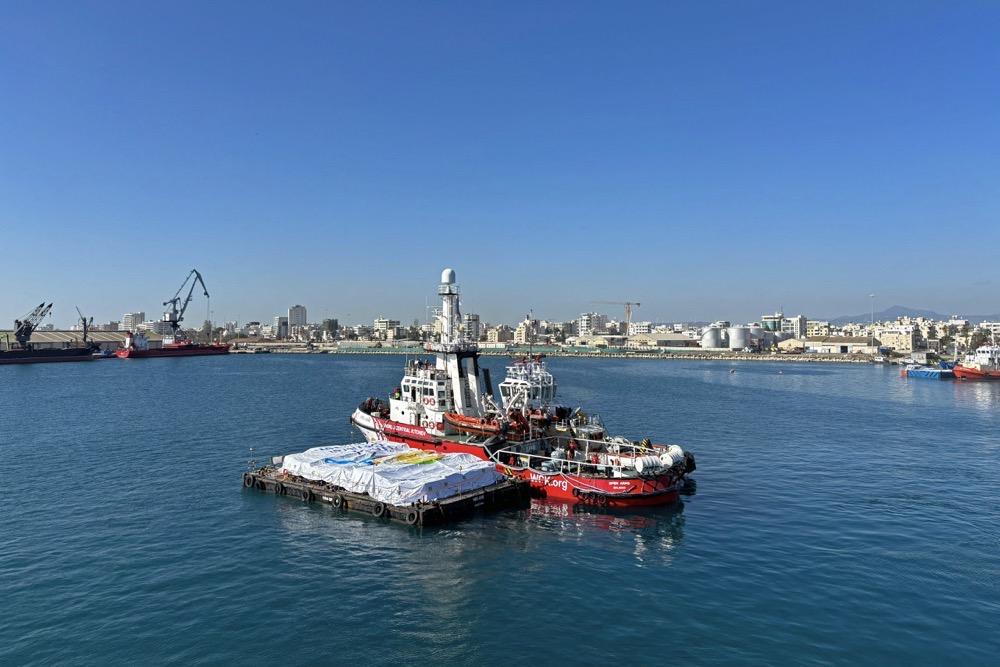
The shipment — largely funded by the UAE — was organized by US charity World Central Kitchen. (AFP)
“Essentially, what sort of change it can offer is dependent on a few factors — namely, how big it is and how much aid it can actually get into Gaza,” he said. “Right now, every little helps, on top of what is already getting in, for as long as those 500 truckloads of aid that are needed to keep Gaza running are not getting in.”
Mekelberg added that provisions being parachuted in are just as valuable as those coming by land or sea.
However, he continued, if the proposed floating dock is to make a real difference, then time is of the essence. He cited estimates that the dock could take two months to build, despite warnings from aid agencies that some 576,000 people are already on the brink of famine.
Ahmed Fouad Alkhatib, founder of Project Unified Assistance, which aims to establish a UN-operated humanitarian airport in Gaza, wrote on X that the temporary dock was a “mammoth step” that could have a “transformative impact if implemented effectively.”
“It’s also historic because it will be the first time in a contemporary context that Gaza will have a functioning seaport which can receive regular, large-scale cargo shipments,” he said.
“After the food airdrops, US involvement in establishing a maritime corridor will bolster Washington’s diplomatic posture and signal the Biden administration’s seriousness about ending the humanitarian catastrophe that Gaza’s civilian population is experiencing.”
Support for the maritime corridor, though, has not been universal. Medecins Sans Frontieres slammed the plans as a “glaring distraction,” and urged the US to instead force Israel’s hand to allow more trucks to enter the enclave.
Avril Benoit, the organization’s executive director, said the US had to address the “real problem,” namely what he described as “Israel’s indiscriminate and disproportionate military campaign and punishing siege.”
In a statement, Benoit added: “The food, water, and medical supplies so desperately needed by people in Gaza are sitting just across the border.
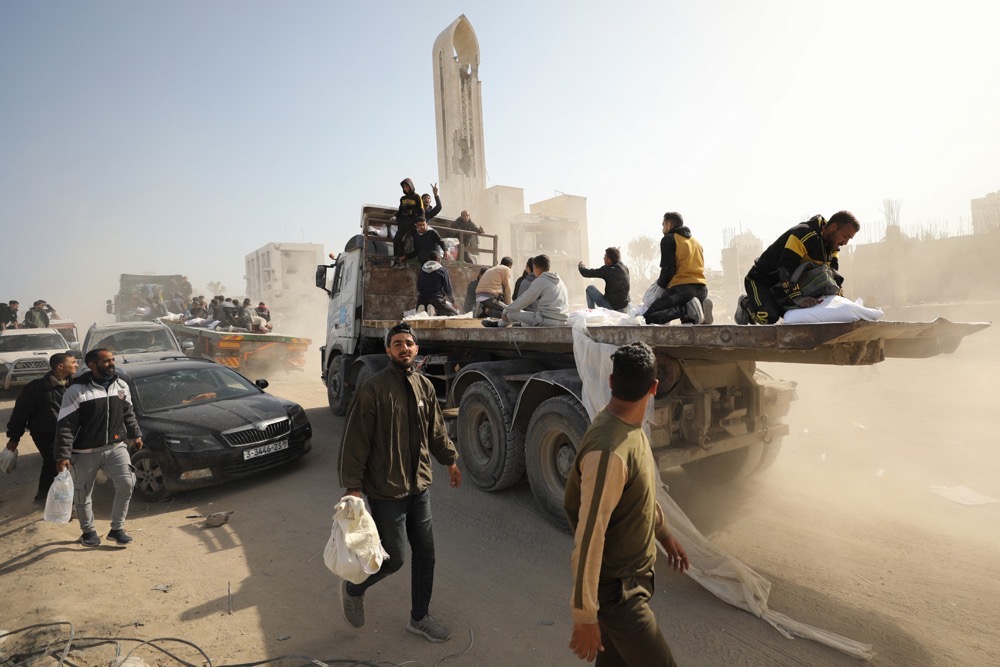
According to Israeli authorities, 89 trucks carrying humanitarian aid were inspected and transferred to the Gaza Strip on March 13. (AFP)
“Israel needs to facilitate rather than block the flow of supplies. This isn’t a logistics problem; it is a political problem. Rather than look to a workaround, the US should insist on immediate humanitarian access using roads and entry points that already exist.”
Israel denies it is restricting the entry of aid and has instead shifted the blame to humanitarian organizations operating inside Gaza, claiming that hundreds of trucks filled with aid are sitting idle on the Palestinian side of the main crossing.
The UN says it cannot always reach the trucks at the crossing because, at times, it can be too dangerous.
So, short of increasing the number of trucks entering Gaza and guaranteeing the safe delivery of the aid they carry, many view the maritime option as the best alternative.
“Looking at the big picture for the US government, being a patron for such an act is, of course, better than nothing, but overall (it is) pathetic compared to the actual pressure that could be rendered on Israel to stop the attacks,” said Roknifard.
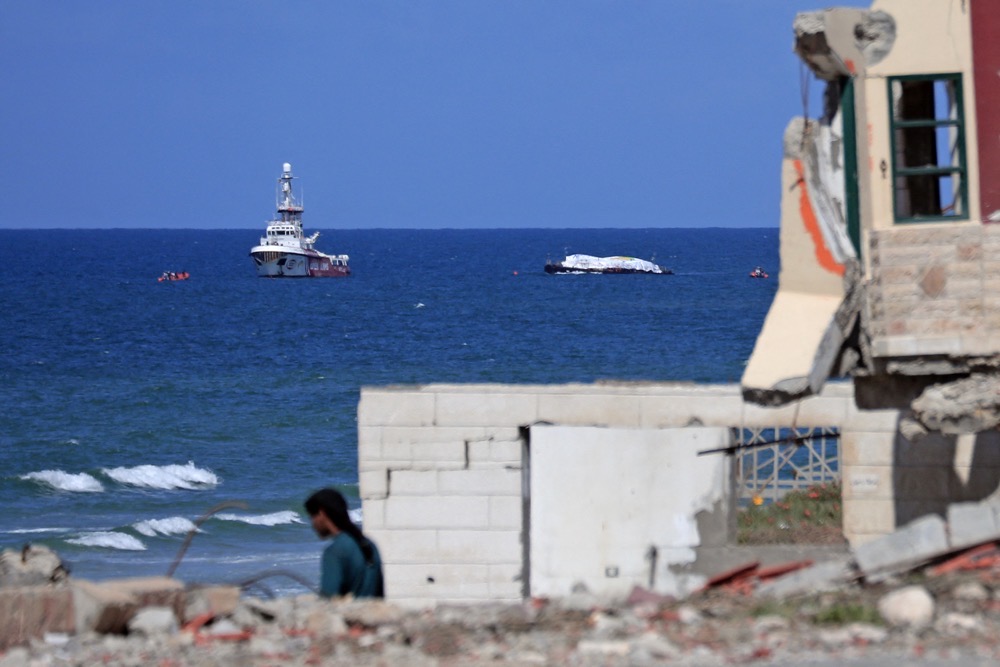
The Spanish-flagged Open Arms left Cyprus on March 12. (AFP)
Roknifard believes the US should use its leverage to “twist Israel’s arm” and force Israeli Prime Minister Benjamin Netanyahu and his coalition partners to allow sufficient aid to arrive by road.
Such a move is unlikely, however, given the upcoming US presidential election, which Roknifard said presents a “major roadblock” to the necessary “political will.”
Although this still seems “like a pretty lame excuse for not doing the real thing,” Roknifard said the maritime corridor was at least better than dropping aid from the air.
